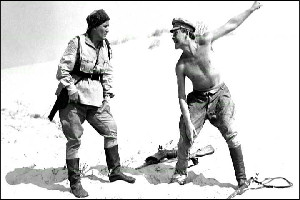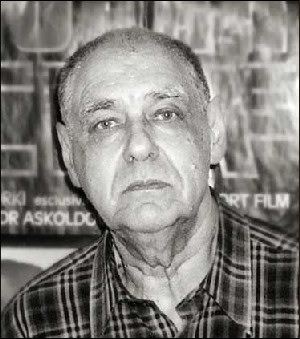COMMISSAR -
(C)
| USSR, Gor'kii
Film Studio, 1967 (released 1987) B&W, 105 minutes In Russian with English subtitles Director and Screenwriter: Aleksandr Askol'dov Based on: Vasilii Grossman's "In the Town of Berdichev" Cinematography: Valerii Ginzburg Composer: Al'fred Shnitke Sound: Evgenii Bazanov, Liia Benevol'skaia, Nikolai Sharyi Costumes: Iakov Rivosh Cast: Nonna Mordiukova, Rolan Bykov, Raisa Nedashkovskaia, Liudmila Volynskaia, Otar Koberidze, Vasilii Shukshin |
 |
Aleksandr Askol'dov's
Commissar is based on Vasilii Grossman's "In the Town of Berdichev"
(1934), a story of a female commissar who gives up her baby to a Jewish family
during the Polish-Soviet War in order to return to the front. While Grossman's
story was praised, including by Maksim Gor'kii, Askol'dov's Commissar (1967)
was "shelved" and stored in the Gosfil'mofond archives for twenty
years. Made to honor the 50th anniversary of the Bolshevik revolution, Commissar
was finally released shortly after the 15th Moscow International Film Festival
in 1987. The film received several unpublicized screenings in the Soviet Union,
but was an enormous success at international film festivals the following
year.
Commissar takes advantage of the dichotomy between Jewish and Soviet ideals
in order to pit the private space of the family against the public space of
civic duty: Klavdiia Vavilova, the commissar of a Red Army Unit, must decide
between caring for her new-born child and fighting in the Civil War. While
"In the Town of Berdichev" celebrates the decision to abandon one's
child for the cause of the revolution, Commissar ultimately sympathizes with
the private, politically disinterested ideals of the Jewish family. The clash
of ideologies between the two groups is transcended by the birth of the child
and comrade Vavilova's subsequent transformation into a mother. She briefly
loses sight of the revolution, staying with the family as the Red Army begins
to leave the town. In these moments, Vavilova not only participates as an
integral part of her substitute family, but also behaves "like a Jewish
mother."
Commissar's depiction of Jews focuses on one family, in which the father, Efim, advocates an "International of kindness" instead of any form of Bolshevism. Rolan Bykov, Raisa Nedashkovskaia, and Liudmila Volynskaia give masterful performances as Jews, whose "otherness" is reinforced by Nonna Mordiukova's portrayal of the commissar. Language and song play a major role in shaping each character's Jewishness: Volynskaia, who plays Efim's mother, speaks in Yiddish throughout the film; Bykov's almost theatrical dance and song performances unexpectedly emerge in several scenes, placing Jewish folk culture alongside more serious questions of life and death in the film.
Commissar's treatment of Jewishness allows Askol'dov to explore topics other than the individual's relationship to the state. The film comments on the plight of the Jews under the Russians, Soviets, and later under the Nazis in the Great Patriotic War, a topic that was rarely addressed in film. Vavilova's visions of Efim and his family marching into a concentration camp do not portray the family as Soviets, but as Jews, all wearing the Star of David. They are separate from Vavilova, who stands holding her child and can only bear witness to the scene.
Aleksandr Askol'dov was never allowed to direct another film. Commissar's legacy is strongly tied with the director's struggle to have the film released. The film makes extensive use of vivid flashbacks and flashforwards, all captured by violent camera movement and point of view shots. Askol'dov relies on asynchronous sound during flashback scenes to link events together, most notably during Vavilova's labor in the childbirth scene, where her cries are heard over the action of numerous intercut flashbacks.
Commissar's exploration of Jewish and Soviet identities universalizes human experience. The film seeks to focus the viewer's attention on the value of human life, rather than on the differences between two world views. Although Commissar may not take a neutral stance in this task, the film seeks to move beyond Soviet and Jewish questions: questions that censors could not ignore at the time of the film's release.
Aleksandr Askol'dov
 |
Aleksandr Askol'dov (born in 1932) graduated from the Department of Philology at Moscow State University in 1955. He continued his studies at the Department of Soviet Literature in the Writer's Union, studying directing and screenwriting under Georgii Tovstonogov. Askol'dov submitted the script for Commissar in 1965 and completed the project in 1967. On 11 March 1969 he was relieved of his position as assistant-director, and on 15 December 1969 was expelled from the Communist Party and blacklisted from working in the film industry. Askol'dov's Party ban was lifted in 1971. He successfully protested for the film's release at the 1987 Moscow International Film Festival, claiming that the film's suppression reflected the failures of glasnost. Askol'dov later received numerous awards for Commissar, including four at the 38th International Film Festival in West Berlin. |
1967
Commissar (released 1987)